David Irving featured on Channel
Four
An Independent Mind

On 8th December I attended a preview screening
of An Independent Mind at the Royal Society of Arts,
followed by Q&A with the director, Rex Bloomstein, chaired
by a Channel Four News journalist. The film was broadcast across
the UK on Tuesday 9th December at 10 pm on More4.
A UAF mob had assembled outside the RSA's fine premises: one or
two were even allowed in, and though on what for them counts as
best behaviour made fools of themselves by distributing leaflets
linking David Irving to the BNP.

The Great Room of the Royal Society where
An Independent Mind
was screened on 8th December
Though Irving's case dominated the question time,
happily the vast majority of the audience agreed that it was entirely
reasonable to include an interview with Irving in a film about
free speech issues.
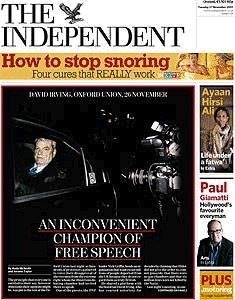
Both for the producers of An Independent
Mind and for the Oxford Union (above)
David Irving has proved an inconvenient champion of free speech
Irving is the last of eight cases to be addressed
in the film, the others include an African singer, a Syrian communist
poet, an Algerian cartoonist, a Guatemalan human rights activist,
a troupe of Burmese comedians, a Chinese sex blogger and a Basque
nationalist band (the latter something of a cross between Skrewdriver
and an Irish republican band).
Bloomstein's style is to let the interviewees tell their stories
without too obviously heavy directorial intervention. The resulting
film displays the many facets of the free speech argument. His
own position (as expanded during the Q&A) is that free speech
should be allowed except where there is an incitement to violence
or other serious crime. In reply to my question he made clear
that he was worried about the encroachment of the European
Arrest Warrant system dismantling traditional British freedoms,
and potentially allowing European censorship laws to be applied
in the U.K. without even being debated in our Parliament. He added
that (as a Jew himself) he had once favoured the criminalisation
of "Holocaust denial", but his work as a documentary
film maker had convinced him of the importance of free research
and debate.
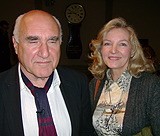
Rex Bloomstein, producer of An Independent
Mind with
twistpeak exposé documentary maker Lady Renouf
at the Royal Society
At the end of a question time which had been dominated
by the Irving segment of the film, Bloomstein was pressed further
on the question of whether "racism" cuts both ways,
and whether as a man who had made a film about the history of
"anti-semitism" he would also make or contribute to
a film about the history of "anti-gentilism" and the
"racist" implications of the Hebrew scriptures' division
of the world between Jew and gentile. Although Mr. Bloomstein
made the film The Longest Hatred (in collaboration with
Robert Wistrich) about anti-semitism, he indicated that he didn't
know enough about the notion of "anti-gentilism" and
suggested that the questioner should make the film! He appeared
true to his publicly stated principles and agreed that he would
be happy to view such a film and even give a foreword. The questioner
pointed out that while David Irving would certainly not share
these perceptions, many of the news items and perspicacious comments
detailed on his
website would seem in her view to amount to a chronicle of
anti-gentilism.

Rex Bloomstein's earlier film The Longest
Hatred
focused on the notion of anti-semitism
Though a self-identified Jew himself and appearing
unfamiliar with the concept of "anti-gentile", Mr. Bloomstein
seemed to acknowledge that it was not in principle "racist"
to dare to address such subjects, or to set "anti-semitism"
in such a context. (The questioner asked the audience of 150 in
the Royal
Society's "Great Room", appropriately decorated
by James Barry's vast and celebrated paintings The Progress
of Human Knowledge and Culture, to witness this unusual and
frank public commitment to free enquiry and to participation in
such a project.)
Throughout its 90 minutes An Independent Mind avoids
cliché and opts for unusual illustrations of the free speech
point rather than hackneyed tales. Perhaps the most unusual are
the Chinese, Spanish and British examples. In choosing to focus
on a sex blogger rather than the usual "dissidents",
Bloomstein offers a seldom seen perspective on Chinese "modernisation",
though I couldn't help thinking that this story actually showed
how China is about forty years behind Europe in its sexual politics,
with the central character seriously imagining that her online
promiscuity was some sort of subversive challenge to patriarchy.
The Basque nationalist band seemed to push the idea of free speech
to its limit, and many viewers will suspect that the Spanish authorities
have a good case in seeing them as apologists for terrorism.

Though his film featured an interview
with a group linked to the terrorist group ETA responsible for
the above attacks, protests against Bloomstein have focused instead
on his interview with British historian David Irving
After a colourful world tour on the margins of
free expression, Bloomstein consciously presents Irving in a stereotypically
English and "respectable" setting, as though to pose
the double paradox: this 70-year-old public schoolboy (whose early
rebellion against authority involved refusal to wear school uniform,
making him an unlikely "neo-nazi") is simultaneously
a product of the establishment and a dangerous anti-authoritarian
revolutionary, in contrast to Theodor Adorno's infamous stereotype
of the "authoritarian personality". The most awkward
challenge to liberal ideas of freedom are close to home, not among
Central American death squads or Middle Eastern torturers.
I felt that one questioner at the RSA missed the point by suggesting
that this was a disappointingly downbeat, "grey" ending
after a lively, cosmopolitan hour and a half. It is surely no
accident that Bloomstein chose to end his film with a segment
on Irving, who very appropriately is given the last word. In answering
questions from both critics and supporters of Irving's inclusion
in the film, the director appeared somewhat awestruck by his subject's
determination and the scale of his archival excavations.
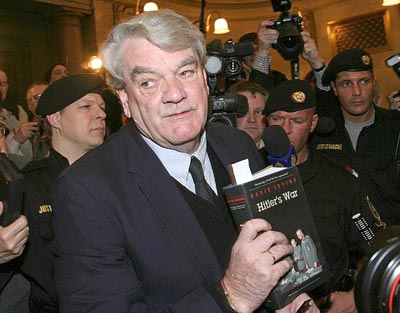
David Irving on his way into a Viennese
court before his jail sentence in 2006
Many revisionists among others will
be unhappy with the emphasis of Irving's comments, both what is
said and what goes unsaid. As far as Irving's comments on the
Holocaust are concerned, we must await his forthcoming book on
Himmler to discover precisely how his views have evolved since
the comments about Holocaust witnesses in 1989 which led to his
arrest and incarceration in Austria sixteen years later. His attitude
in 1989 is well summarised by his introduction to the first Leuchter
report published that year, and available
on Irving's website.
The central (and for liberals very awkward) question remains:
why should modern European countries criminalise opinions, an
act which puts them in principle (if not yet in full brutal practice)
on the same side as the world's most notorious banana republics.
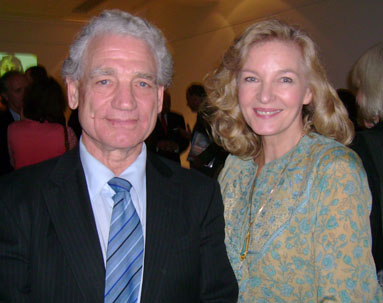
Victory for Exactitude

Neturei Karta attacked
arson destroys dissident Jews' HQ

Ernst Zündel - five year jail sentence
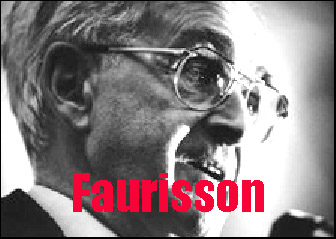
Robert Faurisson - new translation
of Tehran interview

Germar Rudolf - 30 month jail sentence

David Irving - speech to Oxford
Union breaks anti-revisionist taboo

The background to the worldwide
persecution of Holocaust revisionists is examined in Lady Renouf's
new DVD Jailing Opinions,
reviewed here.
Further information about Ernst Zündel's
battle for truth and justice can be found at the
Zündelsite
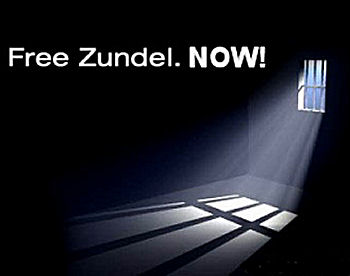
|
 |
Everyone
has the right to freedom of opinion and expression;
this right includes freedom to hold opinions without
interference and to seek, receive and impart information
and ideas through any media and regardless of frontiers.
Article 19: Universal Declaration of Human Rights

2008 is the 60th anniversary of
the Universal Declaration of Human Rights.
Independent filmmaker Rex
Bloomstein has produced An Independent Mind
to mark this anniversary.
The film was broadcast in
the U.K. on More 4 at 10 pm on Tuesday December
9th.
Tom Sutcliffe, TV critic
of The Independent, commented:
Rex Bloomstein's An Independent Mind,
shown in the True Stories strand, was a tribute
to backbone, too, profiling eight individuals who,
whatever you thought of their views, had shown a
certain resilience in expressing them. It opened
with Article 19 of the Universal Declaration of
Human Rights, which states that "everyone has
the right to freedom of opinion and expression",
and it implicitly defended that right without dodging
the fact that there's nothing in the text that says
the opinions must be nice or tasteful.
...Most significantly, he ended his film with David
Irving, imprisoned in Austria for speeches about
the Holocaust and Hitler. He predicted on screen
that this was a decision for which many of his friends
would criticise him, but he was absolutely right
to do it. Even for offensive opinions, contradiction
is the cure, not gagging.
"Total
victory" in Töben case
The
Australian on Töben's victory
Isi
Leibler:
Rethinking prosecution of Holocaust denial
Timothy
Garton Ash: Freedom of historical debate under
attack by the memory police
Geoffrey
Alderman: Denial is not a criminal matter
Index
on Censorship
Avraham
Burg interviewed: Holocaust is over
Mark
Weber: A new assault against free speech
Appel
de Blois - Le Monde publishes historians'
freedom appeal (French)
|
|
|
|

